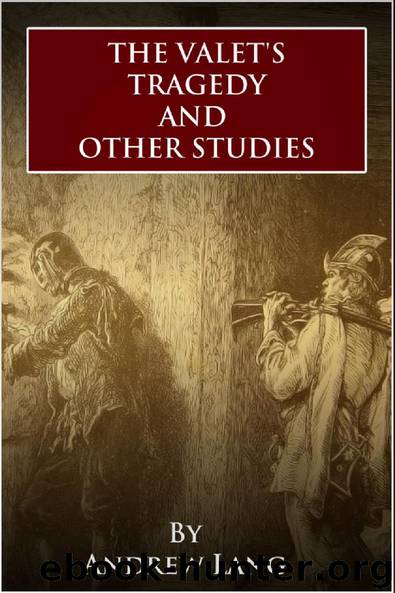The Valet's Tragedy by Andrew Lang

Author:Andrew Lang
Language: eng
Format: epub
Tags: anthropology, history, historical, mystery, mysteries, andrew, lang
ISBN: 9781781669525
Publisher: Andrews UK Limited 2012
Published: 2012-06-21T00:00:00+00:00
VII. THE VOICES OF JEANNE D'ARC
Some of our old English historians write of Jeanne d'Arc, the
Pucelle, as 'the Puzel.' The author of the 'First Part of Henry
VI.,' whether he was Shakespeare or not, has a pun on the word:
'Pucelle or puzzel, dolphin or dogfish,'
the word 'Puzzel' carrying an unsavoury sense. (Act I. Scene 4.) A puzzle, in the usual meaning of the word, the Maid was to the dramatist. I shall not enter into the dispute as to whether Shakespeare was the author, or part author, of this perplexed drama. But certainly the role of the Pucelle is either by two different hands, or the one author was 'in two minds' about the heroine. Now she appears as la ribaulde of Glasdale's taunt, which made her weep, as the 'bold strumpet' of Talbot's insult in the play. The author adopts or even exaggerates the falsehoods of Anglo-Burgundian legend. The personal purity of Jeanne was not denied by her judges. On the other hand the dramatist makes his 'bold strumpet' a paladin of courage and a perfect patriot, reconciling Burgundy to the national cause by a moving speech on 'the great pity that was in France.' How could a ribaulde, a leaguer-lass, a witch, a sacrificer of blood to devils, display the valour, the absolute self-sacrifice, the eloquent and tender love of native land attributed to the Pucelle of the play? Are there two authors, and is Shakespeare one of them, with his understanding of the human heart? Or is there one puzzled author producing an impossible and contradictory character?
The dramatist has a curious knowledge of minute points in Jeanne's career: he knows and mocks at the sword with five crosses which she found, apparently by clairvoyance, at Fierbois, but his history is distorted and dislocated almost beyond recognition. Jeanne proclaims herself to the Dauphin as the daughter of a shepherd, and as a pure maid. Later she disclaims both her father and her maidenhood. She avers that she was first inspired by a vision of the Virgin (which she never did in fact), and she is haunted by 'fiends,' who represent her St. Michael, St. Catherine, and St. Margaret. After the relief of Orleans the Dauphin exclaims:
'No longer on Saint Denis will we cry,
But Joan la Pucelle shall be France's saint,'
a prophecy which may yet be accomplished. Already accomplished is d'Alencon's promise:
'We'll set thy statue in some holy place.'
To the Duke of Burgundy, the Pucelle of the play speaks as the Maid might have spoken:
'Look on thy country, look on fertile France,
And see the cities and the towns defaced
By wasting ruin of the cruel foe!
As looks the mother on her lowly babe,
When death doth close his tender dying eyes,
See, see, the pining malady of France;
Behold the wounds, the most unnatural wounds,
Which thou thyself hast given her woful breast!
O turn thy edged sword another way;
Strike those that hurt, and hurt not those that help!
One drop of blood drawn from thy country's bosom
Should grieve thee more than streams of foreign gore;
Return thee, therefore, with a flood of tears,
And wash away thy country's stained spots.
Download
This site does not store any files on its server. We only index and link to content provided by other sites. Please contact the content providers to delete copyright contents if any and email us, we'll remove relevant links or contents immediately.
| Anthologies | Short Stories |
The Tidewater Tales by John Barth(12659)
Kathy Andrews Collection by Kathy Andrews(11831)
Tell Tale: Stories by Jeffrey Archer(9037)
This Is How You Lose Her by Junot Diaz(6886)
The Mistress Wife by Lynne Graham(6490)
The Last Wish (The Witcher Book 1) by Andrzej Sapkowski(5467)
Dancing After Hours by Andre Dubus(5279)
The Sympathizer by Viet Thanh Nguyen(4390)
Be in a Treehouse by Pete Nelson(4051)
The Secret Wife by Lynne Graham(3924)
Maps In A Mirror by Orson Scott Card(3899)
Tangled by Emma Chase(3755)
Ficciones by Jorge Luis Borges(3634)
The House on Mango Street by Sandra Cisneros(3472)
A Knight of the Seven Kingdoms by George R R Martin(3371)
Girls Who Bite by Delilah Devlin(3255)
You Lost Him at Hello by Jess McCann(3073)
MatchUp by Lee Child(2882)
Once Upon a Wedding by Kait Nolan(2793)
